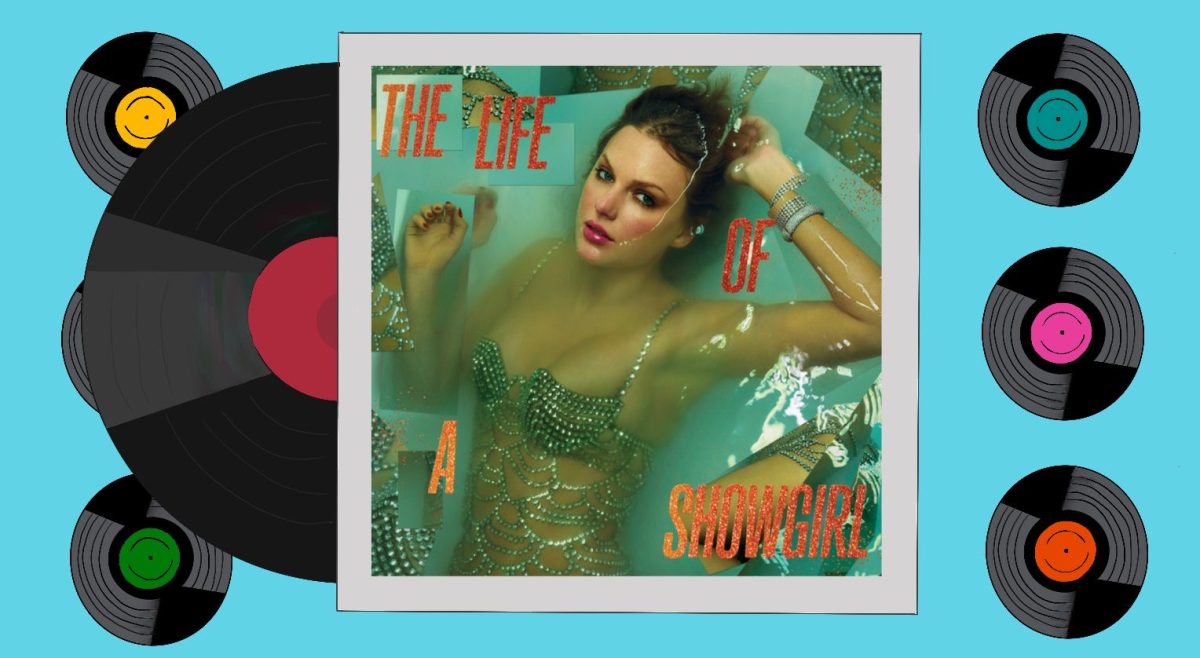
Maddie Mulligan
(Parker Leaf / Heights Senior Staff)
★★☆☆☆
For someone who made Rolling Stone’s Top 100 Greatest Songwriters of All Time list, Taylor Swift delivered an album surprisingly thin on the lyrical depth that once defined her. After a long-anticipated, 18-month wait, Swift released The Life of a Showgirl on Friday, breaking Spotify’s 2025 Single-Day Streaming Record.
Swifties set a high bar for her 12th LP, but The Life of a Showgirl merely grazes it.
“The Fate of Ophelia” opens the album with the classic Swift storytelling touch, referencing Shakespeare’s Hamlet character of the same name. Ophelia’s tragic downfall and drowning stand in for heartbreak and the loss of control—themes Swift has returned to time and time again. In the Shakespearean play, it is the breakdown of her relationship with the prince that propels Ophelia’s madness, which Swift appears to use as a metaphor for her own experiences.
“Late one night / You dug me out of my grave and / Saved my heart from the fate of / Ophelia (Ophelia),” sings Swift.
Following the same narrative song style, “Elizabeth Taylor” draws parallels between the iconic actress’ love life and Swift’s own past relationships. Swift misleads us by starting off the track with a melancholic mood and, right before the chorus hits, a reputation-esque beat drops, and suddenly, 2017 Taylor is back.
“I’d cry my eyes violet, Elizabeth Taylor / Tell me for real, do you think it’s forever?” sings Swift.
The theme of revenge lingers throughout the entirety of The Life of a Showgirl. The catchy “Father Figure” borrows its title from the George Michael classic. It hints at the dark side of the industry that Swift came to know through her previous label’s CEO, Scott Borchetta, who attempted to leverage power over the singer.
“I can make deals with the devil because my d–k’s bigger / This love is pure profit, just step into my office,” Swift sings.
The fifth track, “Eldest Daughter,” seemed like a gift to older sisters—an anthem waiting to happen. Unfortunately, that was not the case—the track was a hard listen. Swift attempted to relate to younger fans with Gen Z slang, but, as one would imagine, it came across as cringeworthy instead.
“But I’m not a bad b—h / And this isn’t savage,” Swift sings.
Long-lost sounds are reintroduced throughout the album, showing fans Swift’s nostalgic side. “Ruin the Friendship” is reminiscent of Nashville Swift, as the singer thinks back to her prom days when all her worries revolved around whether to kiss the boy, in other words, whether to ruin the friendship.
That being said, the lyrics in The Life of a Showgirl oftentimes come across as immature. Perhaps this is another of Swift’s attempts to connect to the younger crowd.
Swift, who is 35, is known for her high school–focused lyrics, but it might be time to stray away from that a bit. After more than two decades writing about teenage heartbreak, Swift has built a legacy on those themes—one that now gives her the freedom to explore new territory. It would’ve been nice to see more emotional and intellectual growth in this new album.
One thing the album isn’t missing, however, are “dirty” lyrics. They show the singer’s growing comfort with her audience as well as her sexual maturity.
In her 11th studio album, The Tortured Poets Department, Swift presented a new and fresh side of herself, with scandalous lyrics such as those in “Guilty as Sin?” This time around, though, the sexual innuendos seem out of place, lacking depth, and don’t seem to be serving a purpose.
“Stop talking dirty to me / It sounded nasty, but it / Feels like you’re flirting with me / It’s kind of making me wet (Oh),” sings Swift on “Actually Romantic.”
The old radio-sounding backing vocals at the end of “Actually Romantic” could be mistaken for an Olivia Rodrigo song—perhaps, another of Swift’s attempts to appeal to younger listeners?
In the seventh track, the musical decisions land just right. Swifties get a sweet and sunny chorus with “Wi$h Li$t”—perhaps a glimpse of Swift’s future with fiancé Travis Kelce.
“I just want you, huh / Have a couple kids, got the whole block looking like you / Got me dreaming ‘bout a driveway with a basketball hoop,” sings Swift.
Swift left the best for last. The title track, “The Life of a Showgirl (feat. Sabrina Carpenter),” comes full circle with another storytelling-style song. The dazzling duet follows the highs and lows of a showgirl—all the glamour, but also the not-so-magical reality of life when the spotlight fades.
“You’re softer than a kitten so / You don’t know the life of a showgirl, babe / And you’re never gonna wanna,” Swift sings.
The Life of a Showgirl is a statement to pop, to all of Swift’s past eras, and what she hopes to build and become someday. For Swifties who are there for the singer’s lyrical masterpieces, those whose favorite albums are evermore and folklore—or their chippy alternative, Lover—the new album fails to meet expectations. For those who are there for high-energy beats and happy melodies, the new release may be just what they were looking for.
For all its shimmer, The Life of a Showgirl glitters with confidence but falters in substance—an album where the performance outshines the poetry.